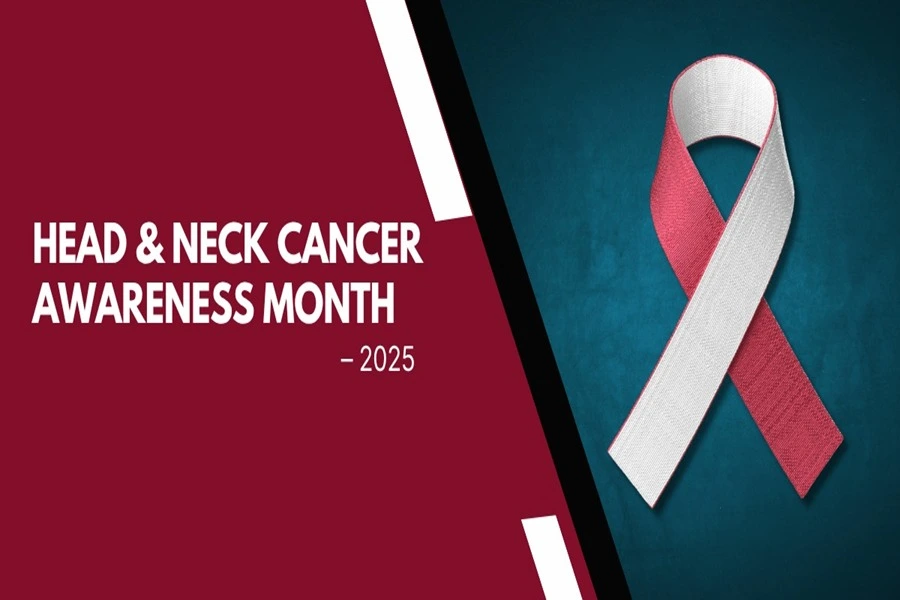
April is Head and Neck Cancer Awareness Month, a global initiative that brings attention to one of the world’s most under-recognized yet impactful categories of cancer. According to the World Health Organization, more than 900,000 people globally are diagnosed with head and neck cancers each year. In India, these cancers account for about 30% of all cancer cases, making them a major public health concern.
Dr. Sandeep Nayak of MACS Clinic, a top-notch facility for Head and Neck Surgery in India, says:
“Raising awareness about head and neck cancers is not just about statistics—it’s about saving lives through early detection, prevention, and informed choices. Each conversation we spark during this month has the power to protect a future. Let’s use this opportunity to educate and empower our communities.”
Ready to learn how you can make a difference this April? Let’s dive in.
Why Is Head & Neck Cancer Awareness Month Important?
Awareness campaigns like Head & Neck Cancer Awareness Month 2025 serve a vital purpose: they bridge the gap between silent symptoms and proactive health decisions. By shining a light on these lesser-known cancers, the month encourages people to:
- Recognize early warning signs
- Take preventive steps
- Encourage loved ones to seek timely diagnosis
- Advocate for accessible screenings
In India, where late-stage diagnosis is common, awareness can play a transformative role in improving survival rates and reducing complications.
Concerned about unusual symptoms like persistent mouth sores or hoarseness? Speak to a qualified specialist today to understand your next steps.
What Is Head and Neck Cancer?
Head and neck malignancies are a group of physiologically related diseases that start in the mouth, throat, voice box, sinuses, nasal cavity, and salivary glands. These cancers usually originate from the squamous cells lining the moist surfaces in these regions.
Common types include:
- Oral Cavity Cancer – affects lips, tongue, and inside the mouth
- Pharyngeal Cancer – occurs in the throat (pharynx)
- Laryngeal Cancer – impacts the voice box
- Nasopharyngeal Cancer – behind the nose
- Salivary Gland Cancer – rarer, but serious
Each of these types presents differently, but the need for early detection is universal.
Common Causes and Risk Factors
Understanding the risk factors is a critical step in prevention and timely diagnosis. While some risks are lifestyle-related, others may be genetic or environmental.
Top causes and risk factors include:
- Tobacco use (smoking or chewing) – major contributor in India
- Excessive alcohol consumption
- HPV (Human Papillomavirus) infection
- Poor oral hygiene
- Prolonged sun exposure (especially for lip cancer)
- Exposure to industrial toxins
- Family history of cancer
Prevention Tips for Head & Neck Cancer
You have more control over your cancer risk than you might think. Simple lifestyle changes and regular check-ups can go a long way.
Here’s how to reduce your risk:
- Quit tobacco and limit alcohol
- Get vaccinated for HPV
- Maintain oral hygiene and attend dental check-ups
- Eat a balanced diet rich in antioxidants
- Use sun protection for lips
- Be aware of your family history and inform your doctor
- Go for regular head and neck screenings, especially if you’re over 40 or at high risk
How to Participate in Awareness Month – 2025
Head & Neck Cancer Awareness Month 2025 is about collective action. Whether you’re a healthcare provider, patient, caregiver, or advocate, your participation can make a difference.
Get involved:
- Wear the awareness color – The official burgundy and ivory ribbon symbolizes head and neck cancer awareness.
- Join community screenings or medical camps
- Share your story on social media to inspire others
- Attend webinars and educational events
- Distribute awareness pamphlets at local clinics or schools
- Support cancer foundations or NGOs
- Light up landmarks in burgundy and ivory to honor survivors and raise awareness
- Even a small gesture can ripple into life-saving action for someone else.
Conclusion
Head & Neck Cancer Awareness Month is not just a calendar event—it’s a call to action. With growing numbers in India and worldwide, it’s never been more important to prioritize awareness, early diagnosis, and accessible care.
We can reduce the burden of these cancers through education and proactive health practices. Whether you’re someone at risk, a caregiver, or a concerned citizen, your involvement counts.
Let April 2025 be the month you choose knowledge, prevention, and support.
Frequently Asked Questions
What are the first signs of head and neck cancer?
Early signs may include a persistent sore throat, difficulty swallowing, a lump in the neck, hoarseness, ear pain, or non-healing mouth ulcers. These symptoms can often be mistaken for minor infections, so it’s crucial to seek medical advice if they persist.
How is head and neck cancer diagnosed?
Diagnosis involves a clinical examination, imaging (CT, MRI, PET scans), and biopsy of the suspected lesion. In some cases, endoscopy is used to examine deeper regions like the throat and voice box.
Is head and neck cancer preventable?
Yes, many cases are preventable through lifestyle changes like quitting tobacco, limiting alcohol, maintaining oral health, and getting vaccinated for HPV. Early detection through screenings also improves outcomes significantly.
Where can I get screened for head and neck cancer?
Screenings are offered at ENT clinics, oncology centers, and many public hospitals during awareness month. Some NGOs and private clinics also run free or subsidized screening programs in April.
References:
Disclaimer: The information shared in this content is for educational purposes only and not for promotional use.




